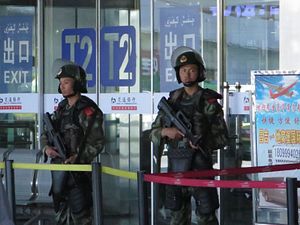In recent months, the Chinese government has stepped up security intensity in Xinjiang Uyghur Autonomous region. A public alarm system rings out three times a day through the streets of Kashgar in Xinjiang, after which shopkeepers “rush out of their stores swinging government-issued wooden clubs,” according to Reuters. These are part of mandatory anti-terror drills supervised by local police. The shopkeepers fight off imaginary knife-wielding terrorists, while armored vehicles drive around menacingly.
China claims that there is a serious threat from Islamist extremists in the far western region of Xinjiang. Since 2014, when two separate instances of terrorism at major train stations were perpetrated by Xinjiang independence extremists – one a frenzied mass knife attack, and the other a bomb threat – the government has accused separatists among Xinjiang’s indigenous Muslim Uygur ethnic minority of stirring up tensions with the ethnic Han Chinese majority and plotting attacks elsewhere in China.
The fact that there is an unofficial Han resettlement program does not help the situation. For decades, Chinese authorities have implemented cultural invasion by attrition, creating industries to tap into the resource-rich and extremely lucrative geography and encouraging members of the Han majority to move to the region. It is estimated that Xinjiang’s coal reserves make up approximately 38 percent of the country’s national total. Oil production from the province makes up 13 percent of the total. It also produces close to 30 percent of the country’s natural gas.
Kashgar has long been a major trading post along the ancient Silk Road. It has now become an essential node in Xi Jinping’s “One Belt, One Road” (OBOR) initiative. The president’s signature infrastructure, foreign policy, and economic project has already seen agreements with many countries in Asia, Africa, the Middle East, and Europe. OBOR effectively inserts China as a major economic and political player across the African and Eurasian continents, but bringing the plan to fruition requires stability in Xinjiang.
With a summit based on OBOR scheduled to be held in May in Beijing, Xinjiang has come into the spotlight. As a key trading hub along OBOR, it is more important now than ever that there be no cause for concern. The official Chinese security line is that current security measures in Xinjiang are not politically motivated, but rather based on continuing terrorism developments. Though there is without a doubt an element of separatism in the region, authorities tend to decline to provide any details. The Chinese government have been keen to focus on sovereignty as the key underlying issue, making it is much easier to justify sending in the military.
Whether under the real or perceived threat of terrorism, China has created a security state in its western region, and it is determined to continue fighting off imaginary knife-wielding terrorists.
































